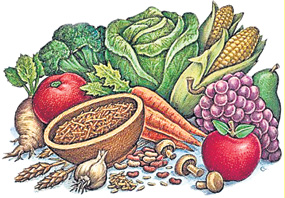
Have you got all these in your diet?Deciding to become a vegetarian isn't just about not eating meat; it requires a careful consideration of your whole diet to ensure that nutrients usually provided by meat or dairy products are obtained from other foods. However, with careful thought vegetarian diets can be a very healthy option. Protein: Meat is an excellent source of high-quality protein. Vegetarians must substitute meat with other protein-rich foods, such as pulses, cereals, dairy products and nuts. Pulses are also rich in soluble fibre, which has been shown to be protective against cardiovascular disease (CVD).
Soya protein is also an excellent substitute for meat and is available in a convenient and tasty form in many ready-made meals. A diet that includes at least 25g of soya per day has been associated with reductions in some forms of cancer and CVD. Quorn and tofu are other high-protein foods suitable for vegetarians. Iron: Non-meat eaters have to be careful about their iron levels, since the type of iron found in red meat is particularly well absorbed by the body. Other sources include fortified breakfast cereals, bread, pulses, green leafy vegetables and dried fruit. Calcium: Vegans need to check their intake of calcium. Soya milk is a good substitute for cow's milk and is widely available in supermarkets. White bread contains added calcium and some manufacturers now produce other foods that have been fortified with this mineral (check the label for details). Zinc: Meat and dairy products are rich sources of zinc, but serious nutritional deficiencies among most vegetarian groups are rare. It seems probable that the body is able to adjust to lower intakes of zinc. Vitamin B12: People who exclude all animal products from their diets may develop a deficiency of vitamin B12 and should take a dietary supplement, as this vitamin doesn't occur naturally in plant-based foods.-
(BBC Health) |
|
||||||
|| Front
Page | News | Editorial | Columns | Sports | Plus | Financial
Times | International | Mirror | TV
Times | Funday
Times | Medi Scene || |
| |
Reproduction of articles permitted when used without any alterations to contents and a link to the source page.
|
© Copyright
2008 | Wijeya
Newspapers Ltd.Colombo. Sri Lanka. All Rights Reserved. |
